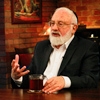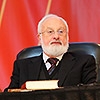Two Paradigms In A Person
 Question: In Russian psychiatry, patients with mental disorders have always been called “soul sickness,” meaning their condition is associated with the soul. Western directions call it a mental illness (mentally ill), associated with the brain. Where is this soul and what is it?
Question: In Russian psychiatry, patients with mental disorders have always been called “soul sickness,” meaning their condition is associated with the soul. Western directions call it a mental illness (mentally ill), associated with the brain. Where is this soul and what is it?
Answer: I do not know what a soul is in terms of mental, psychiatric, and psychological formulations. From their point of view, this is the highest nervous activity of a person that we can study.
In fact, the soul is a much higher structure, one might even say, the highest, which we cannot realize and perceive to the extent, in those volumes, in that knowledge, or in those feelings in which we are currently. But we can study it in ourselves, only in ourselves, if we undergo special psychological training.
Such training is determined by Kabbalah very simply. We must begin to act above our nature. It turns out that this is quite simple because if our whole nature is nothing more than an egoistic desire to receive pleasure, then we must begin to apply certain exercises on ourselves that would help us rise above this natural desire to bring enjoyment to ourselves to a different kind of impressions from ourselves and from the world, that is to work in the opposite direction, to bring enjoyment to others, moreover, above yourself, in spite of yourself.
This requires a certain environment that will push a person to this, organize him or her. Then one would begin to feel completely different inner impulses, thoughts, feelings, and attitudes toward others absolutely opposite to what one experienced before.
And these are not just kind, good relationships, because in the end they are transformed into a very interesting structure where a person feels themselves rising above their nature. Since we define the world as something that is given to us in our sensations, we rise above our world.
It turns out that such psychological training allows us to rise above ourselves, to see everything around us in a different way.
And then a person begins to feel oneself divided into two parts: into such a paradigm where one treats everyone with their usual egoistic nature in which we were born and develop under the influence of the environment to that new attitude to the world that was born as a result of Kabbalistic trainings where one has an attitude to the world different from the past attitude, an altruistic attitude. Only this should not be confused with the concept of altruism to which we are accustomed to in our world.
A person feels that they consist, as it were, of two parts: from the perception of the world in bestowal and love, in going out of oneself, let’s call this the “higher perception,” and then the attitude that one feels in oneself to the world and back from the world to yourself, is called the soul. And one’s past attitude to the world and the attitude of the world to it in the usual mutual egoistic flow will be called the body.
Thus, according to our methodology, we begin to divide a person into an egoistic attitude to the world, a bodily one, and an altruistic attitude to the world, a spiritual one.
[283472]
From KabTV’s “Kabbalah and Psychology”
Related Material:
Two Types Of Cognition
Two Paradigms, Two Worlds
The World Of Our Intentions





 Michael Laitman, On Quora:
Michael Laitman, On Quora:





